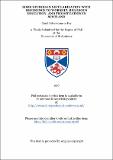Files in this item
Some studies in secularization with reference to worship, religious education, and the situation in Scotland
Item metadata
| dc.contributor.advisor | Trotter, J. D. | |
| dc.contributor.author | Fry, Carol | |
| dc.coverage.spatial | 391 p. | en_US |
| dc.date.accessioned | 2018-06-05T13:07:08Z | |
| dc.date.available | 2018-06-05T13:07:08Z | |
| dc.date.issued | 1977-10 | |
| dc.identifier.uri | https://hdl.handle.net/10023/13728 | |
| dc.description.abstract | Secularization is a term widely used in both sociology and theology, and it bears many meanings. It refers to a process of change, and is logically distinct from both secularism and the concept of the secular society. The complexity of the process prohibits determination of its causes, but urbanisation, and the growth of man's technological mastery of his environment are frequently associated with it. Sociologically, secularization may be understood in terms of several different processes, which describe changes in the form and status of religious beliefs and institutions, and their relationship to the wider society. Theological aspects of secularization centre around changing views of God, man, the world and the Church. Fundamental to both approaches to secularization is the concept of desacralization, and the change from a sacral to a secular view of the universe. The implications of secularization have particular relevance for worship. With the breakdown of traditional views of the relationship between the sacred and the secular, worship is challenged. If it is to be true to the secularized society, it must be more flexible, seeking relevant forms, symbols, expressions and communal settings. Secularization is demonstrated by the changing place of religion in education. The provision of education has moved out of the hands of the Churches, and the teaching of Religious Education in state schools is legally required. The study of religion has become increasingly objectified and differentiated from the religious institutions, and has to conform to the same educational criteria as other subjects. In Scotland, the impact of secularization appears to have been limited. This may be due to the special status of the national Church, as well as to the more rural ethos of the country. The limited degree of secularization is confirmed by a continuing high level of Church membership, as well as by the fact that R.E. in Scotland reveals less objectification and differentiation than that in England and Wales; the feeling of a 'Christian country' remains. Secularization is recognised as a syndrome rather than as a unitary process; it is not new, but is particularly marked as a feature of contemporary society, being manifested in many forms. Even such apparent 'revivals' of religion as the Pentecostal Movement may be seen as a form of secularization. Evaluations of, and responses to the process of secularization vary, but it would appear to be a continuing feature of contemporary life, demanding response in appropriate forms. | en_US |
| dc.subject.lcc | BR789.F8 | en |
| dc.subject.lcsh | Church and state--Scotland | en |
| dc.title | Some studies in secularization with reference to worship, religious education, and the situation in Scotland | en |
This item appears in the following Collection(s)
Items in the St Andrews Research Repository are protected by copyright, with all rights reserved, unless otherwise indicated.

